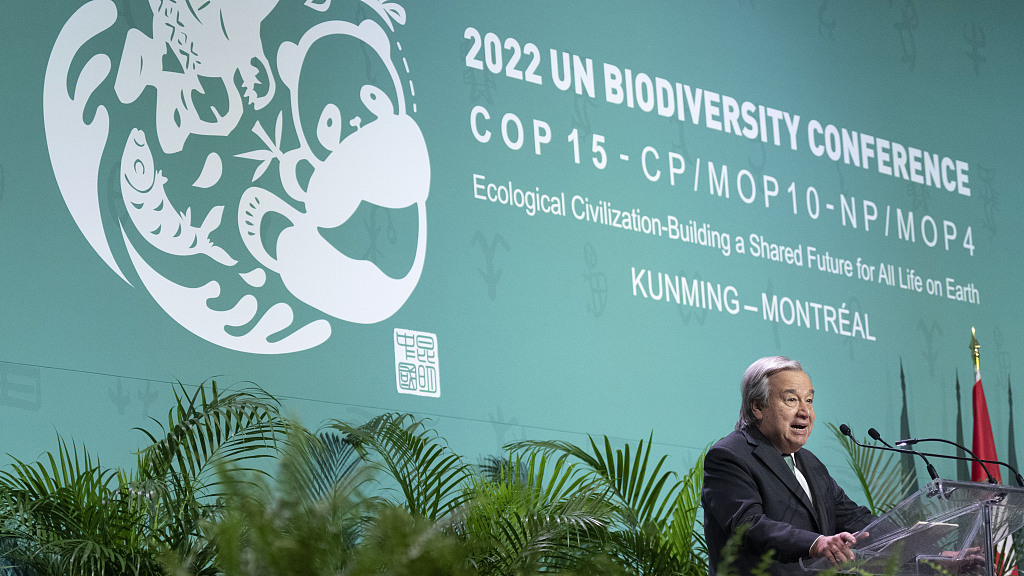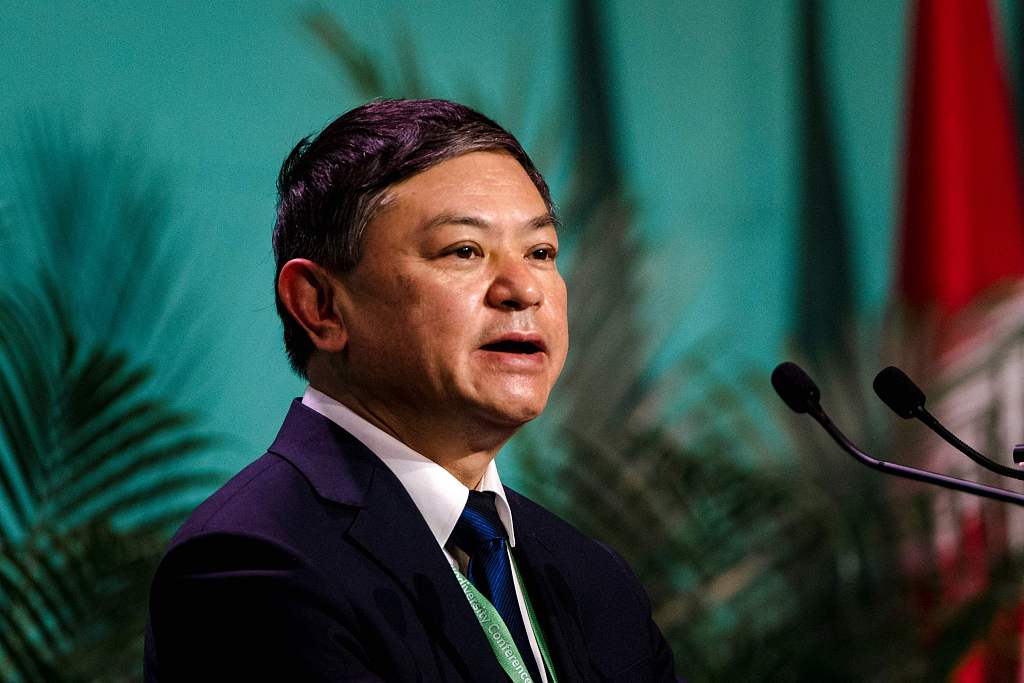
UN Secretary-General Antonio Guterres addresses the opening ceremony of COP15 at Plenary Hall of Montreal Convention Centre in Montreal, Quebec, Canada, December 7, 2022. /VCG
UN Secretary-General Antonio Guterres addresses the opening ceremony of COP15 at Plenary Hall of Montreal Convention Centre in Montreal, Quebec, Canada, December 7, 2022. /VCG
Editor's note: Keith Lamb is a University of Oxford graduate with a Master of Science in Contemporary Chinese Studies. His primary research interests are China's international relations and "socialism with Chinese characteristics." The article reflects the author's opinions and not necessarily the views of CGTN.
COP27 has just completed and COP15 is being held in Montreal, Canada, from December 7 to 19. Don't worry, this isn't a symptom of "the Mandela Effect." There are three COPs this year. COP stands for "Conference of the Parties of an international convention." COP27 focuses on climate change, COP19 on wildlife, and COP15 focuses on ecology and biodiversity. The figure after the COP represents the conference number.
Now that sanity is restored, the bad news is that 1 million species are threatened with extinction. Plant and animal species are vanishing at 1,000 times faster than the natural extinction rate. Ecosystems are collapsing, biodiversity is shrinking, and the targets set over a decade ago, for combating ecological destruction and biodiversity at COP10, in Aichi, Japan, have expired. Though tragically they were never met anyway.
Scientists say we are at a tipping point. If we don't act now the aforementioned problems could run out of control. Some may not intrinsically care about nature or the wealthy, due to living in a clean environment, may not be conscious of our global shared ecological challenge. However, everyone should care as a loss of biodiversity will lead to the ruin of all.
A variety of species is critical to our survival whether that be for our food or even medicine. Ecosystem degradation is estimated to lead to $3 trillion in annual losses and this is seen in higher prices for food, water, and energy.
Climate change weighs heavy on the global public's consciousness but ecological degradation and species loss are not. However, the two cannot be detached. Global warming, due to unfettered emissions and the destruction of the Earth's forests leads, to floods, droughts, and air and water pollution, which is felt directly by the destruction of ecological systems and, in turn, the destruction of biological diversity.
Accordingly, COP15, like COP27, focuses on global citizens' attention toward protecting our shared earthly inheritance, which we belong to and care for. COP15 affords the 196 parties attending, who represent the global populace, an opportunity to work out a new set of targets and mechanisms for accomplishing ecological and biodiversity protections.
Corporations will be attending too as they wish to become part of the solution-forming process and private funders of environmental subsidies to what is expected to be $200 billion a year. Nevertheless, this is a drop in the ocean considering harmful environmental subsidies to businesses are estimated to be nearly $2 trillion a year.
Considering the breakneck speed of development has, as UN Secretary-General Antonio Guterres said, come due to "multinational corporations [are] filling their bank accounts while emptying our world of its natural gifts," we must be conscious of the systemic nature at the root of ecological destruction. Governments if they represent the people must, in the name of global democracy, hold corporations' destructive elements in check for the sake of our survival and theirs.

Chinese Minister of Ecology and Environment Huang Runqiu addresses the opening ceremony of COP15 at Plenary Hall of Montreal Convention Centre in Montreal, Quebec, Canada, December 7, 2022. /VCG
Chinese Minister of Ecology and Environment Huang Runqiu addresses the opening ceremony of COP15 at Plenary Hall of Montreal Convention Centre in Montreal, Quebec, Canada, December 7, 2022. /VCG
Those who care for the survival of humankind cannot blindly cherish a system that prioritizes short-term greed for the minority at the expense of the downfall of the majority and eventually all. Already, it is the poor, indigenous peoples, and developing countries who suffer disproportionately from the loss of biodiversity and ecological destruction. Furthermore, it is they who have the least resources to combat it. Consequently, when it comes to COP15, we must come up with democratic solutions that take into account this inequity.
Already, one solution being touted is the 30-by-30 target where countries commit to protecting 30 percent of their land and sea territories for nature. But it should be noted that many countries have a significantly larger land-to-population ratio.
Sometimes this is due to already having a poor ecological foundation such as countries whose territory expands over the desert but often these countries, with relatively sparse population densities, have arisen due to being the product of settler colonialism, in sparsely populated continents. For some countries, their citizens were given the opportunity to go to these host colonies and so the "mother" state never became overpopulated.
On the other hand, some developing countries have huge populations in relation to their total land area or arable land area. Holding them strictly to the 30 percent rule could be yet another punishment on top of the poorest, which discriminates against their developmental rights.
Thus, countries with huge populations and little arable land might need greater leeway in regards to this 30 percent figure, while to offset developing states, some developed countries could make a greater commitment to the amount of territory they preserve for nature.
There will be all sorts of innovative schemes and solutions proposed at COP15, but what must be a constant theme through them all is first not being afraid to look at the systemic roots of the problems we face and second coming up with equitable democratic solutions that don't punish the poor majority who suffer disproportionately from ecological destruction and a loss of biodiversity.
(If you want to contribute and have specific expertise, please contact us at opinions@cgtn.com. Follow @thouse_opinions on Twitter to discover the latest commentaries in the CGTN Opinion Section.)